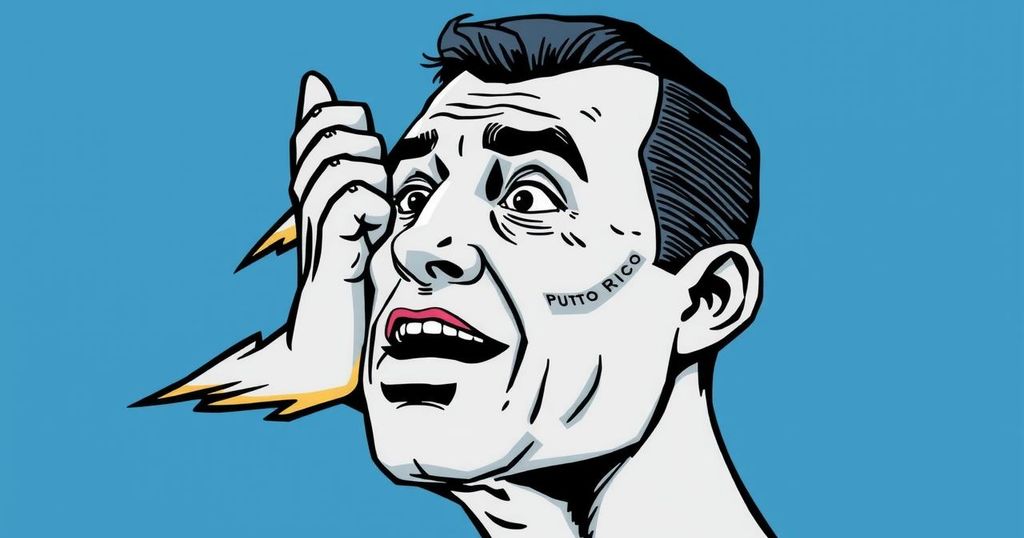Implications of Comedian’s Racist Jokes on Puerto Rican Voter Mobilization

Comedian Tony Hinchcliffe’s racist jokes targeting Puerto Ricans at a Trump rally prompted widespread condemnation and may mobilize Puerto Rican voters ahead of the 2024 election. His remarks drew backlash from both political parties, highlighting the precarious political landscape for Trump in key battleground states where Puerto Ricans hold electoral power.
Comedian Tony Hinchcliffe was scheduled to perform as a warm-up act for a Donald Trump campaign rally at Madison Square Garden. However, his performance drew significant attention for a series of racially charged jokes that targeted various communities, including Puerto Ricans, invoking swift condemnation from across the political spectrum. His comments included derogatory remarks about Puerto Rico, describing it as “a floating island of garbage” and making inappropriate generalizations about Latinos. Hinchcliffe’s remarks have the potential to mobilize voters within the Puerto Rican community, particularly in battleground states like Pennsylvania, where their electoral influence is significant. Following the backlash, Hinchcliffe claimed on social media that his critics lacked humor, while the Trump campaign distanced itself from the comedian’s remarks, stating they did not reflect the campaign’s views. Senior advisor Danielle Alvarez characterized Hinchcliffe’s performance as unrepresentative of Trump’s values. Prominent Republicans, including Senator Rick Scott and Congressman Carlos Gimenez, publicly condemned the jokes as offensive and harmful to Puerto Rican citizens. The timing of these comments coincided with Vice President Kamala Harris’s speech in Philadelphia that aimed to outline support for Puerto Rico, effectively juxtaposing her commitment to the island with Hinchcliffe’s disparaging humor. This incident has sparked discussions regarding voter mobilization leading up to the November 5, 2024 election, with experts suggesting such events can significantly shape public perception and voting behavior. Observers believe this could act as an “October surprise,” with long-lasting effects on voter sentiment and turnout, particularly among those who feel marginalized by Hinchcliffe’s comments. In response to the controversy, Puerto Rican leader Frankie Miranda emphasized the importance of accountability, stating, “We can no longer continue to stay silent when this is the tone that is set at a campaign rally a week before a presidential election.” Additionally, the general perception within the community reflects a growing skepticism toward Trump’s outreach efforts, particularly post his failure to provide sufficient aid following Hurricane Maria, further exacerbating discontent. As Puerto Ricans mobilize for the upcoming election, there is a broader implication for solidarity among various minority groups affected by similar sentiments, reinforcing the high stakes of this electoral period.
The discourse surrounding Racist humor and its implications on electoral politics, particularly in the context of the upcoming presidential election, has garnered widespread attention. Comedian Tony Hinchcliffe’s remarks at a Trump rally have provoked criticism not only for their derogatory nature towards Puerto Rico but also for their timing, coming just days before the election. The Puerto Rican population is critically positioned within battleground states, such as Pennsylvania, Georgia, and North Carolina, where their voting bloc can significantly sway election outcomes. The backlash from Hinchcliffe’s remarks has reopened discussions about the treatment of Puerto Ricans and Latinos in American politics, amidst ongoing efforts by political candidates to engage these important demographic groups.
The backlash to Tony Hinchcliffe’s racist jokes poses a grave challenge to the Trump campaign, particularly concerning its relationship with the Puerto Rican community ahead of the election. With critical voter segments mobilizing in response, the incident may serve to galvanize not only Puerto Rican voters but also other marginalized communities feeling similarly targeted. The implications of this incident underscore the nuanced dynamics of contemporary electoral politics and the critical importance of addressing community sentiments leading up to pivotal elections.
Original Source: time.com







